Laura Aymerich-Franch
Public Acceptance of Cybernetic Avatars in the service sector: Evidence from a Large-Scale Survey in Dubai
Jun 17, 2025Abstract:Cybernetic avatars are hybrid interaction robots or digital representations that combine autonomous capabilities with teleoperated control. This study investigates the acceptance of cybernetic avatars in the highly multicultural society of Dubai, with particular emphasis on robotic avatars for customer service. Specifically, we explore how acceptance varies as a function of robot appearance (e.g., android, robotic-looking, cartoonish), deployment settings (e.g., shopping malls, hotels, hospitals), and functional tasks (e.g., providing information, patrolling). To this end, we conducted a large-scale survey with over 1,000 participants. Overall, cybernetic avatars received a high level of acceptance, with physical robot avatars receiving higher acceptance than digital avatars. In terms of appearance, robot avatars with a highly anthropomorphic robotic appearance were the most accepted, followed by cartoonish designs and androids. Animal-like appearances received the lowest level of acceptance. Among the tasks, providing information and guidance was rated as the most valued. Shopping malls, airports, public transport stations, and museums were the settings with the highest acceptance, whereas healthcare-related spaces received lower levels of support. An analysis by community cluster revealed among others that Emirati respondents showed significantly greater acceptance of android appearances compared to the overall sample, while participants from the 'Other Asia' cluster were significantly more accepting of cartoonish appearances. Our study underscores the importance of incorporating citizen feedback into the design and deployment of cybernetic avatars from the early stages to enhance acceptance of this technology in society.
Socially assistive robots' deployment in healthcare settings: a global perspective
Oct 14, 2021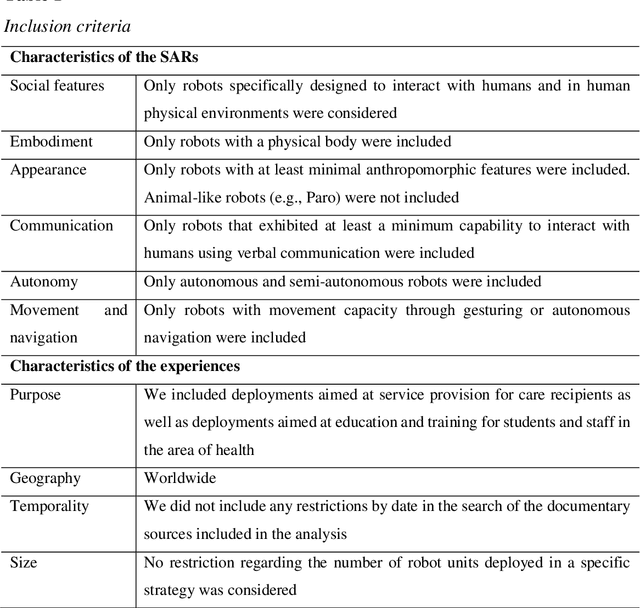
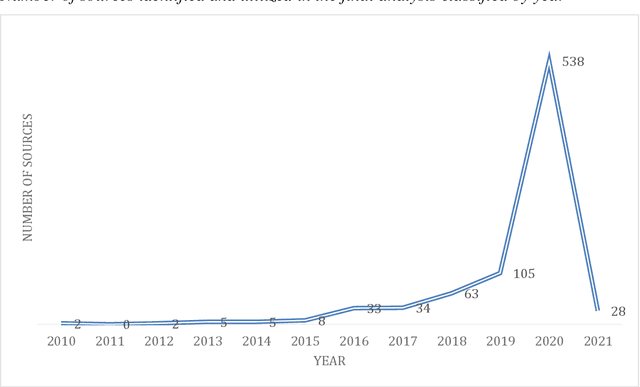
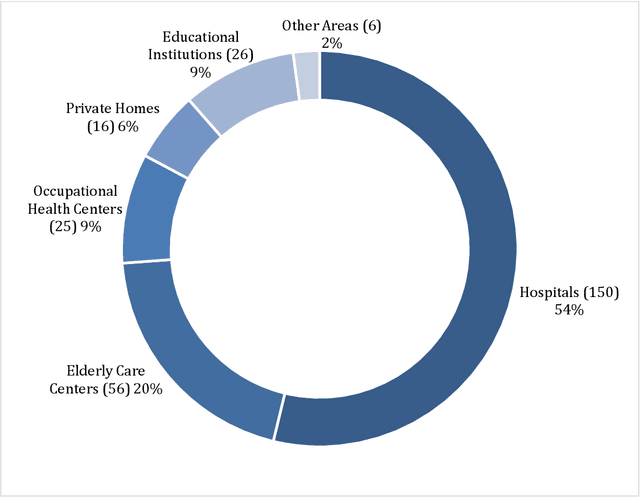
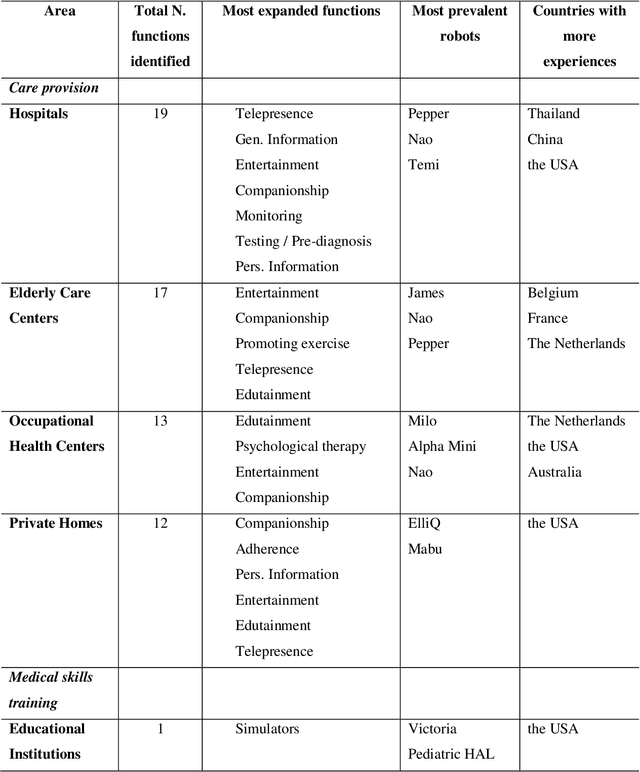
Abstract:One of the major areas where social robots are finding their place in society is for healthcare-related applications. Yet, very little research has mapped the deployment of socially assistive robots (SARs) in real settings. Using a documentary research method, we were able to trace back 279 experiences of SARs deployments in hospitals, elderly care centers, occupational health centers, private homes, and educational institutions worldwide from 33 different countries, and involving 52 different robot models. We retrieved, analyzed, and classified the functions that SARs develop in these experiences, the areas in which they are deployed, the principal manufacturers, and the robot models that are being adopted. The functions we identified for SARs are entertainment, companionship, telepresence, edutainment, providing general and personalized information or advice, monitoring, promotion of physical exercise and rehabilitation, testing and pre-diagnosis, delivering supplies, patient registration, giving location indications, patient simulator, protective measure enforcement, medication and well-being adherence, translating and having conversations in multiple languages, psychological therapy, patrolling, interacting with digital devices, and disinfection. Our work provides an in-depth picture of the current state of the art of SARs' deployment in real scenarios for healthcare-related applications and contributes to understanding better the role of these machines in the healthcare sector.
A Robotic Positive Psychology Coach to Improve College Students' Wellbeing
Sep 08, 2020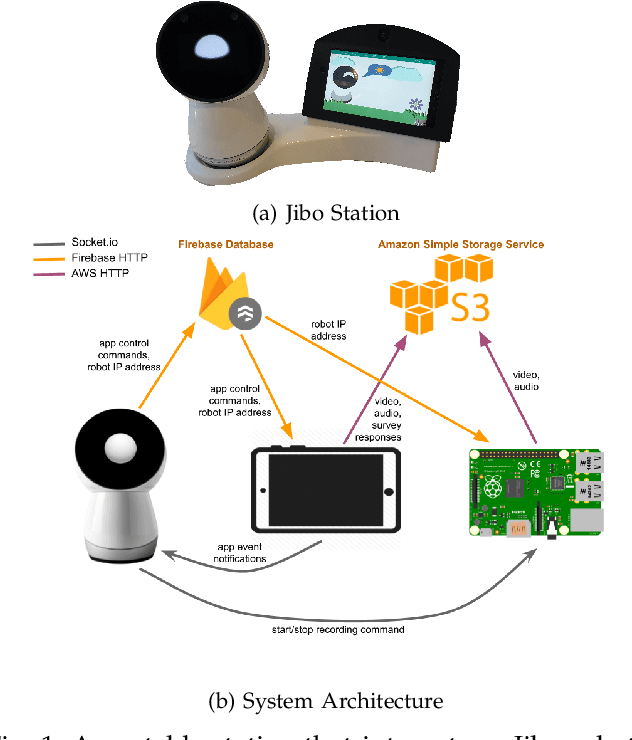
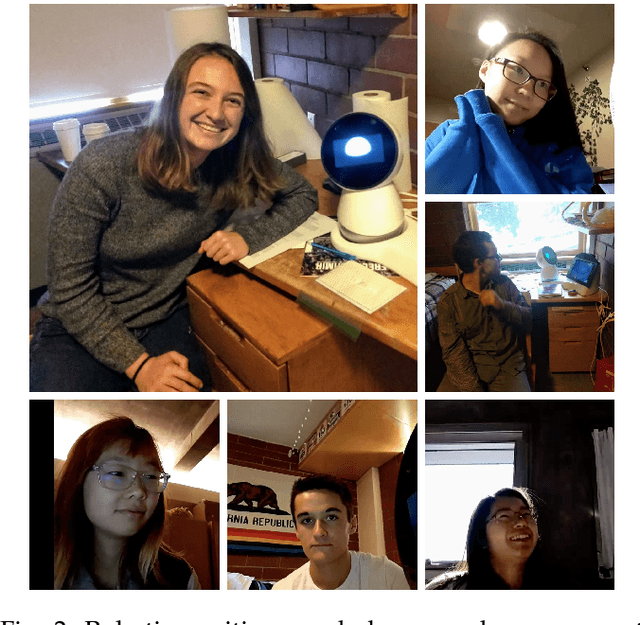

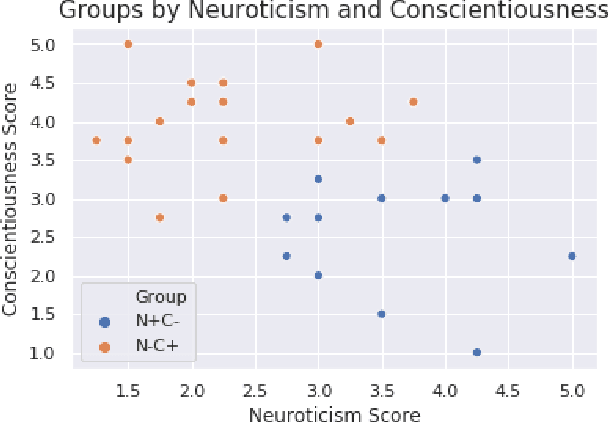
Abstract:A significant number of college students suffer from mental health issues that impact their physical, social, and occupational outcomes. Various scalable technologies have been proposed in order to mitigate the negative impact of mental health disorders. However, the evaluation for these technologies, if done at all, often reports mixed results on improving users' mental health. We need to better understand the factors that align a user's attributes and needs with technology-based interventions for positive outcomes. In psychotherapy theory, therapeutic alliance and rapport between a therapist and a client is regarded as the basis for therapeutic success. In prior works, social robots have shown the potential to build rapport and a working alliance with users in various settings. In this work, we explore the use of a social robot coach to deliver positive psychology interventions to college students living in on-campus dormitories. We recruited 35 college students to participate in our study and deployed a social robot coach in their room. The robot delivered daily positive psychology sessions among other useful skills like delivering the weather forecast, scheduling reminders, etc. We found a statistically significant improvement in participants' psychological wellbeing, mood, and readiness to change behavior for improved wellbeing after they completed the study. Furthermore, students' personality traits were found to have a significant association with intervention efficacy. Analysis of the post-study interview revealed students' appreciation of the robot's companionship and their concerns for privacy.
The implementation of social robots during the COVID-19 pandemic
Jul 08, 2020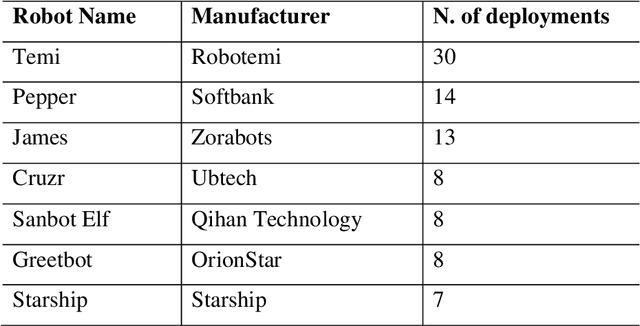

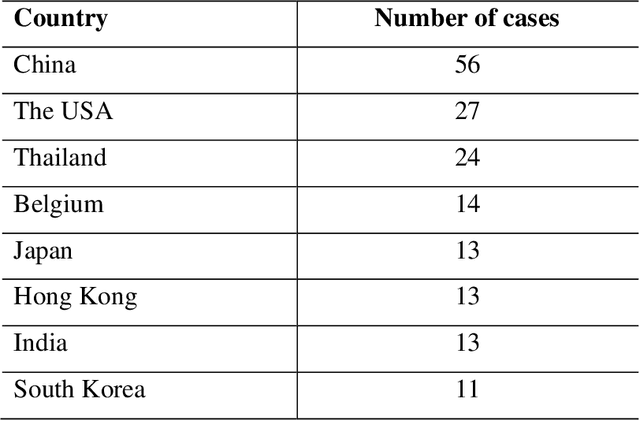

Abstract:The present study examines the implementation of social robots in real settings during the COVID-19 pandemic. In particular, we analyze the areas in which social robots are being adopted, the roles and tasks being fulfilled, and the robot models being implemented. For that, we traced back and analyzed 195 experiences with 66 different social robots worldwide that have been adopted during the coronavirus outbreak. We identified a clear resurgence and expansion of social robots during the crisis. The social robots' capacity to perform the roles of liaison in tasks that require human-human interaction, to act as a safeguard to ensure contagion risk-free environments, and to act as well-being coaches by providing therapeutic and entertaining functions for quarantined patients, which are directly associated with the needs of facilitating physical distance and palliate the effects of isolation, have been key to the renaissance of these robots during the pandemic.
 Add to Chrome
Add to Chrome Add to Firefox
Add to Firefox Add to Edge
Add to Edge